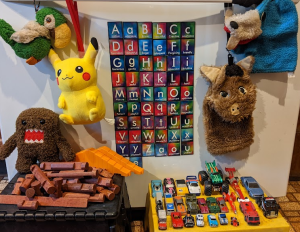Today I realized that I have about a week left in Lent and I’ve barely implemented “The Plan.” Sure, I’ve prayed, fasted, and done some service, BUT pruning a “Room a Day” took a deep dive after Week 3 and pruning my “Desk & Office” area barely started.
So, what do I have to show for the last 2 weeks. First check out the children’s toys that I am willing to part with. The bigger Lenten Lesson, however, is noticing that clearing stuff off shelves and cupboards is not the essence of Lent. Even doing community service, beneficial as that is, may not be the most important action I take. (Click to enlarge photo.→)
 Today, I learned something about Lent by watching birds. At first, they were just a pretty distraction. But then I started reflecting on how they flit from tree to tree, they eat, they reproduce, feed their young, and eventually die. I also noticed that it was the bare trees of March than enabled me to actually watch their cardinal red color and flights more closely.
Today, I learned something about Lent by watching birds. At first, they were just a pretty distraction. But then I started reflecting on how they flit from tree to tree, they eat, they reproduce, feed their young, and eventually die. I also noticed that it was the bare trees of March than enabled me to actually watch their cardinal red color and flights more closely.
* Do I flit from tree to tree too quickly? Maybe my fixation with pruning stuff is hiding some deeper sacrifice I need to make?
* Do the birds have any enemies? Sure, larger birds, animals, and even humans eat them.
This got me thinking more about LOVING MY HUMAN ENEMIES & JUDGMENTALISM.
During Lent I’ve been struck by how judgmental I am of my fellow humans. I don’t usually use the word “enemy” but certainly there are people that I find myself at least internally criticizing, judging, feeling superior to, disliking, or disagreeing with. I hope I am not alone in this. ☹
So, how can I be less judgmental/critical of my human friends?
- Notice when I’m tempted to complain or criticize. What triggers my criticisms? Can I devise a personal warning system to help me be aware (like a rubber band on my wrist…)
- Refrain from speaking to others about my criticism of an individual or group. (If necessary, alert the subject of my complaint to the danger their words/actions have upon themself or others. But beware, this is often more for self-satisfaction than for the other.)
 Seek to understand what might be behind an act I find annoying or offensive, i.e. don’t presume that my analysis of an infraction is the whole story. For example:
Seek to understand what might be behind an act I find annoying or offensive, i.e. don’t presume that my analysis of an infraction is the whole story. For example:
• Maybe that pokey driver on their phone, just received an urgent message about their child’s injury.
• Maybe a politician I disagree with is defending a life value that I uphold but doing it in a way that I believe would negate other values I hold.
• Maybe a child abuser has been a victim of terrible abuse in their own early life.- Remember that I am not blameless. I’ve done things I regret. I’ve made mistakes.
- Let go of stuff I can’t change. Somethings are my business – and some are not.
- God’s mercy and forgiveness extends to all – including me. (If you don’t believe in God, consider how a spirit of forgiveness – and reparation if needed – is more healing than hate.)
- I can protest a decision or action a person takes and call for systemic change, without hating the individual. In fact, the individual fault or tragedy that happens may prompt needed change.This hasn’t been an easy Lent…But it has been enlightening.